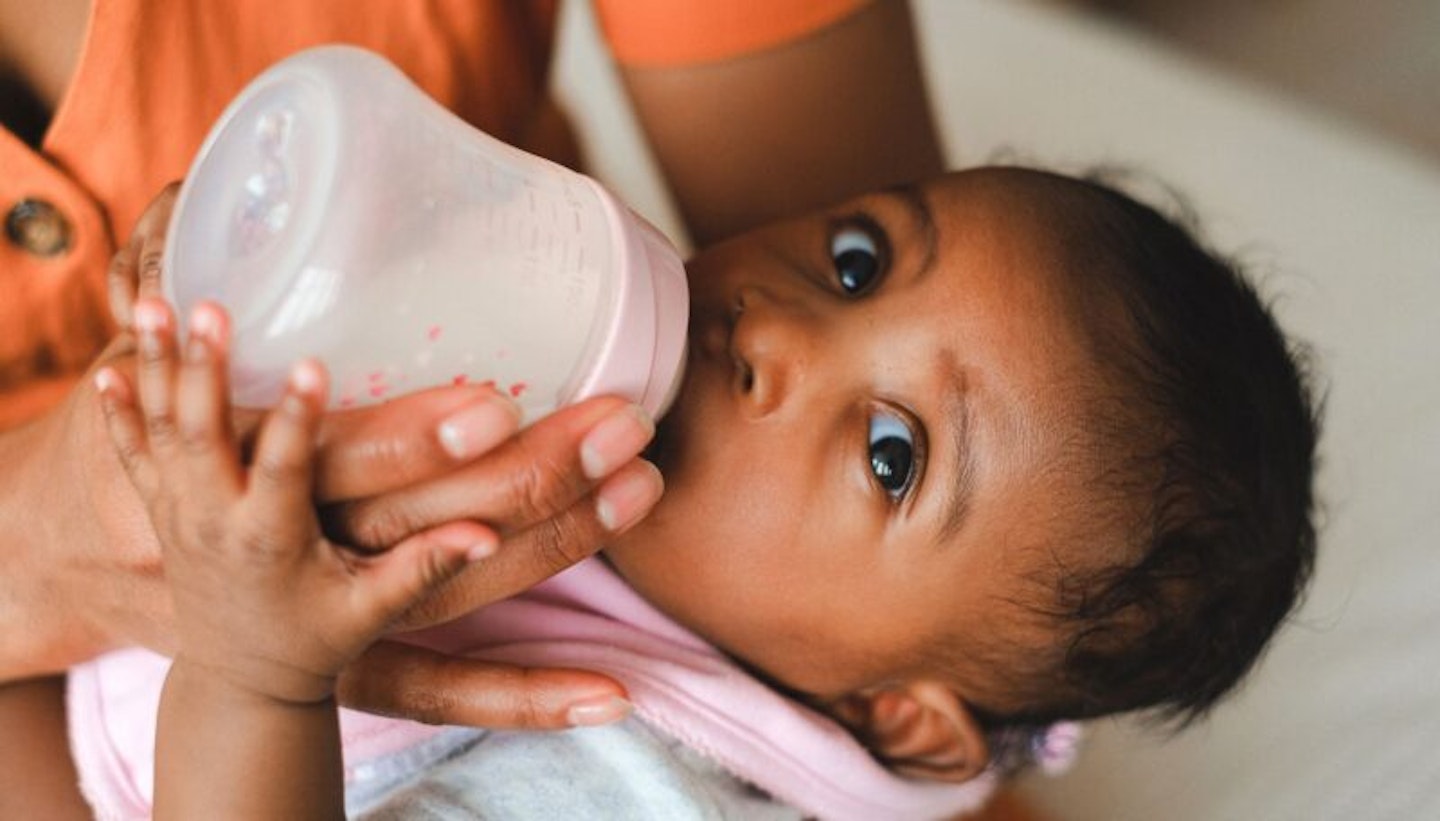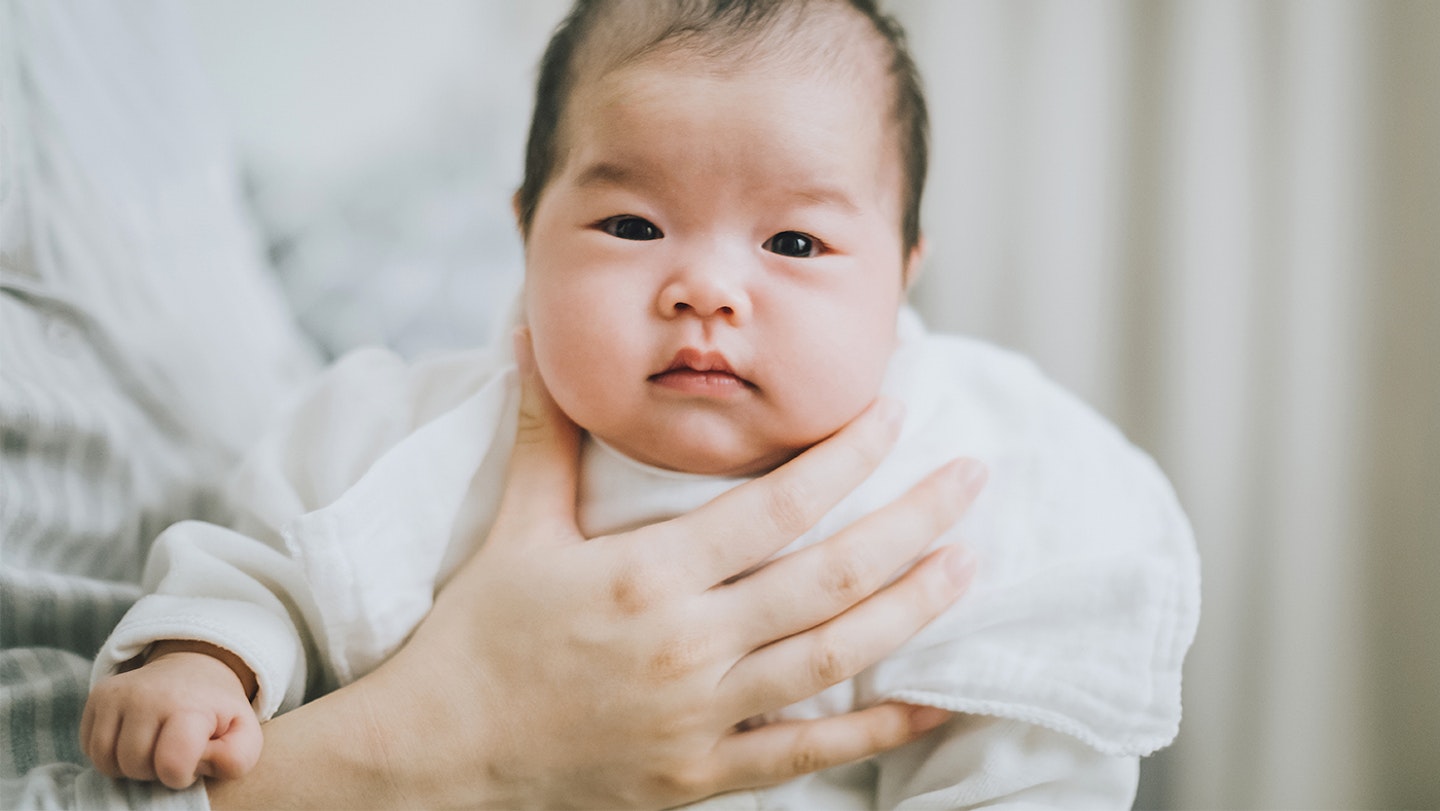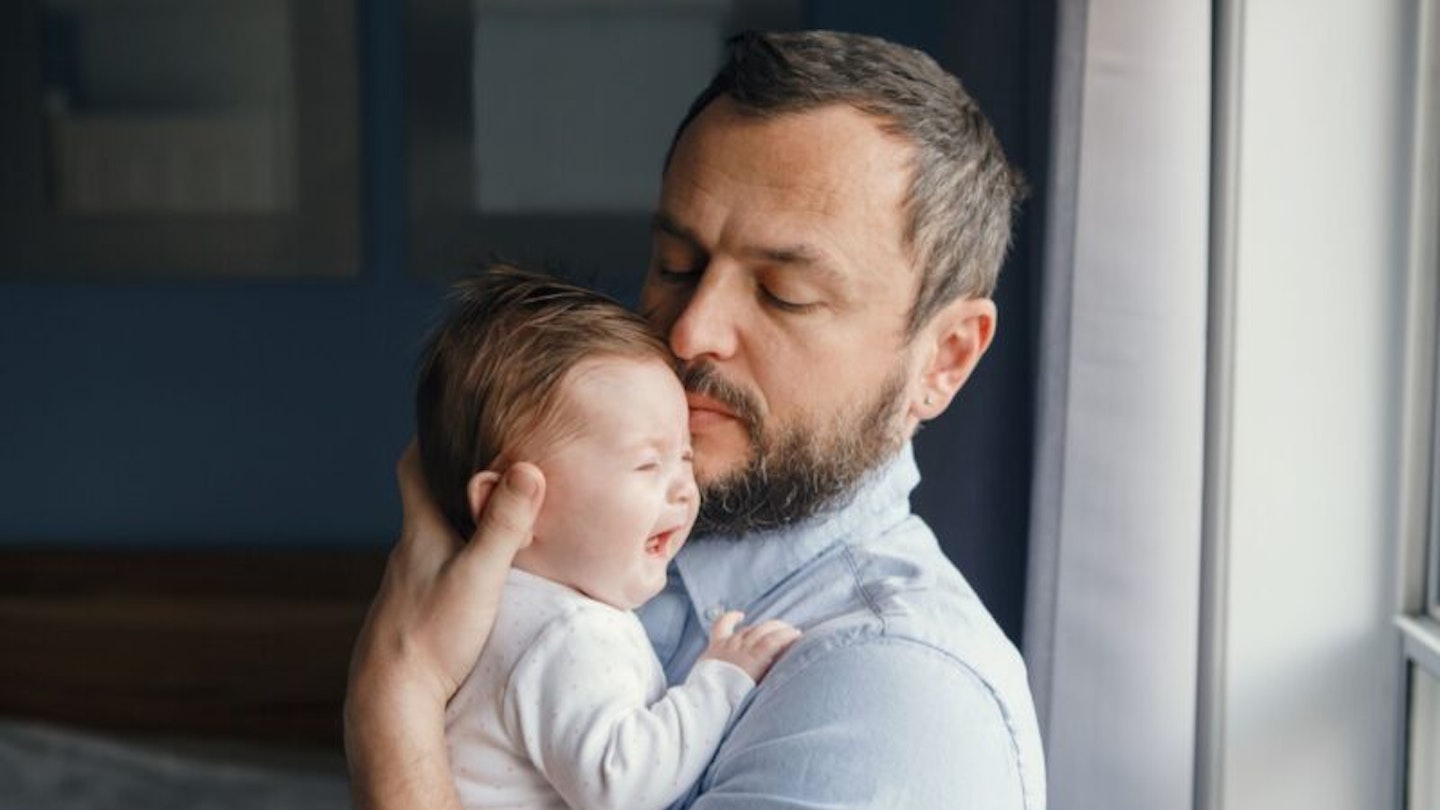Remember those butterflies you'd get when your little one used to hiccup in your womb? Just like then, it's completely normal for your baby to get a bout of hiccups from time to time (and if you ask us, baby hiccups are rather cute!).
Just like when grown-ups get hiccups, they're usually nothing to worry about and tend to go away after a few minutes. However, if you want to try to prevent or get rid of their hiccups, there are a few things you can do to help. We spoke to midwife, Lesley Bland from My Expert Midwife to find out all you need to know about baby hiccups, how to get rid of them, and when to seek help.
Why do babies get hiccups?
Just like adults, babies get hiccups when the diaphragm gets irritated or stimulated in some way such as eating too much or too fast or swallowing at the wrong time. Midwife, Lesley Bland tells us, "Hiccups are caused when the diaphragm (located between the rib cage and abdomen) is irritated and contracts involuntarily causing baby to take in large volumes of air under high pressure. When the force of the air hits baby’s vocal cords an audible “hiccup” sound can be heard."
To understand why babies get hiccups, you could make note of when your little one tends to get them For instance, many babies get hiccups after feeding which can be a sign that they're drinking too quickly, taking in too much air, or drinking too much.
Lesley also notes that "for some babies, acid reflux, which often presents around 8-12 weeks of age, can also present as hiccups; this is caused when stomach acid flows back up the food pipe irritating the diaphragm resulting in hiccups." The good news is that reflux usually resolves by around 12 months.
Hiccups in breastfed babies
Lesley explains that "Breastfed babies tend to experience fewer bouts of hiccups than those who are bottle fed as they are less likely to take in gulps of air with their milk."
If your breastfed baby does have hiccups, Lesley suggests you could:
• Try different feeding positions to see what suits your baby best, or try more frequent, shorter feeds.
• Try burping your baby mid-feed holding them upright over your shoulder, seated upright on your knee, or laying face-down across your lap, and gently but firmly patting or rubbing their backs to bring the small gassy bubbles together so baby can burp them out.

Hiccups in bottle-fed babies
"Bottle fed babies may be more prone to hiccups than those who are breastfed because there is air in the bottle which they make take in as they feed" says Lesley. If they do get hiccups while feeding, Lesley suggests the following:
• Try feeding baby upright and adopt paced-bottle feeding where you give baby more control over their feeds but which also slows the flow of the milk through the teat by holding it horizontally rather than vertically, and reduces overfeeding; it more closely mimics how a baby breastfeeds.
• Try burping your baby frequently during feeds holding them upright over your shoulder, seated upright on your knee, or laying face-down across your lap, and gently but firmly patting or rubbing their backs to bring the small gassy bubbles together so baby can burp them out.
Some baby bottles are also designed to help with reflux so you could try alternative bottles to see if that helps.
How to get rid of baby hiccups
Although adult hiccups can be a bit annoying and even wake us up, babies are typically not affected by them. They can often sleep through hiccups without being disturbed. "Because hiccups in babies is usually nothing to be concerned about there is no need to try and get rid of them, in fact they will usually disappear within a few minutes of their own accord," says Lesley.
However, if your baby does seem to be disturbed and you're wondering how to get rid of hiccups in babies, there are a few things you can try:
Rub their back
Help release excess air by rubbing your little one's back in a circular motion. As well as potentially helping to stop the hiccups, it's also a soothing way to comfort your child. Lesley suggests gently rocking, patting and bouncing your baby to help them settle and stay calm.
Wind your baby
Burping your baby during and after feeding can sometimes help get rid of any excess gas that might be causing the hiccups. If you're breastfeeding, try winding your baby before you switch to your other breast and for bottle-fed babies, burp periodically. If you're struggling to burp them, you could try gripe water to ease their discomfort.

Give them a dummy
Sucking on a dummy will help relax your baby’s diaphragm and may help to stop the hiccups. Midwife Lesley notes that this also encourages the production of saliva which neutralises stomach acid.
Change position
While it may not always stop their hiccups, depending on their age you could try laying them down or propping them into a sitting position to see if this helps.
Let the hiccups run their course
Sometimes, if the hiccups don’t seem to be affecting your baby, you can just leave them be. Just remember, if they get hiccups a lot and they don’t stop on their own, or they seem to be bothering your baby, you should seek medical advice and let your doctor know.
Is there anything you shouldn’t do if your baby has hiccups?
Lesley notes that there is no evidence that gripe water or Infacol can help hiccups. She also says that while you might try scaring an adult to get rid of hiccups, this isn't going to work with babies and may actually make them worse.
"Try not to use scaring your baby to cure hiccups, this has no scientific basis and will only serve to cause more upset and distress in them which can in turn worsen their hiccups."
How to prevent hiccups
Although there are a number of different causes of newborn hiccups, and quite often, you won’t be able to work out the cause, there are some things you can do to help prevent hiccups.
• Check how quickly your baby is feeding their milk as drinking too fast could mean they are taking in air which can result in hiccups. Lesley advises adopting paced or responsive feeding for bottle fed babies to slow down feeds and reduce risk of overfeeding.
• It’s a good idea to make sure your baby isn’t upset or crying before you feed them. Try to feed your baby when they’re calm and before they get to the point where they’re crying out in hunger. Lesley explains that this is because "gasping and crying can cause them to take in increased volumes of air."
• After feeding, let your baby relax and avoid too much activity.
• Double check your baby's bottle as some designs trap more air in than others when feeding so it's worth trying different brands if you're baby is experiencing a lot of hiccups.
• Keep your baby in an upright position for 20-30 minutes after each feed.
But while you can try to prevent hiccups, Lesley notes that it is important to recognise that generally hiccups are nothing to worry about. As long as baby is happy and not showing signs of distress you can let the hiccups run their course.
When should you worry about baby hiccups?
Most baby hiccups are perfectly normal and there's no need to worry. In some cases they can be a sign of silent reflux so if your baby has frequent hiccups and seems to be in pain or unsettled after feeding, speak to your doctor.
Lesley explains, "As a rule hiccups in babies are normal and are nothing to worry about as they tend to be short-lived and resolve themselves with no treatment within several minutes. However, if you are concerned that their hiccups have persisted for more than a couple of weeks or have become progressively more distressing, or are accompanied by frequent spitting up/vomiting, arching their back after a feed, appear constantly uncomfortable after a feed, have difficulty sleeping or breathing, are coughing or wheezing, or have poor weight gain we would advise seeking medical advice from your GP."
Baby hiccups: the takeaways
Remember, it's important for parents to remember that hiccups are usually not a cause for concern. However, if the hiccups persist for a prolonged period, cause significant distress, or are accompanied by other troubling symptoms, consulting a pediatrician is advisable.
By staying informed and prepared, parents can navigate the hiccup phase with confidence and ensure their baby's comfort and well-being.
Baby hiccups FAQs
How do I stop hiccups in my newborn?
To stop newborn hiccups, you could try taking a short break while feeding and burping them before moving onto the other breast or returning to the bottle.
Do hiccups mean baby is too full?
It's possible that hiccups may be a sign your baby has taken in too much air while feeding. If they're prone to hiccups, burping them during and after feeding should avoid this.
Is it okay to lay baby down with hiccups?
It's fine to lie baby down with hiccups provided they're not in distress or pain which could also be a sign of reflux.
What is the best position for baby hiccups?
Keeping baby upright after feeding can make them more comfortable if they have hiccups. You could also feed them in a more upright position.
About the expert
Lesley Bland BA (Hons), BSc (Hons) Midwifery Studies is a Registered Midwife and Consultant Midwife for My Expert Midwife. She began her Midwifery career working in large teaching hospitals rotating through all clinical areas with particular emphasis on antenatal and intrapartum care. Lesley qualified as a mentor of students and developed a passion for education specialising as a Clinical Educator teaching the maternity multidisciplinary team.
Emily Gilbert is a Digital Writer for Mother&Baby and has written for the website and previously the magazine for six years. Specialising in product reviews, Emily is the first to know about all the exciting new releases in the parenting industry.
